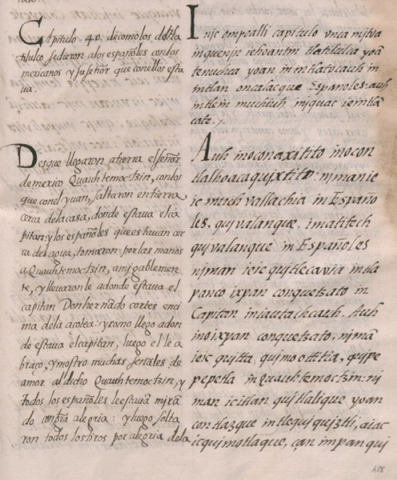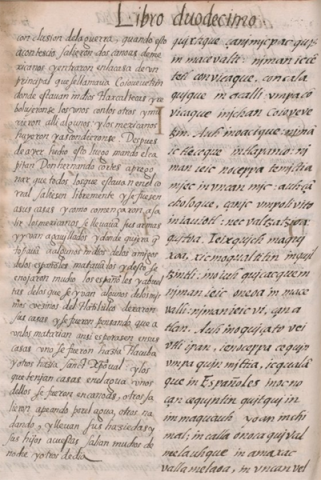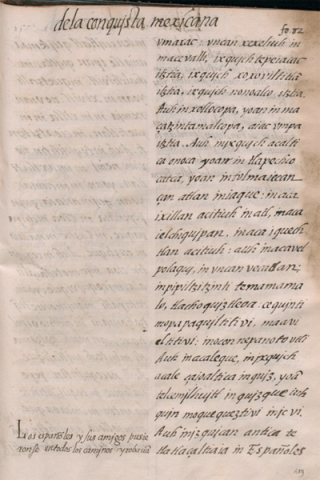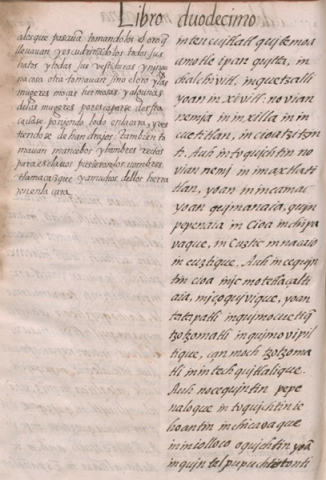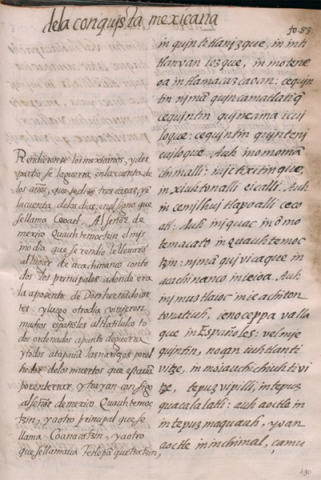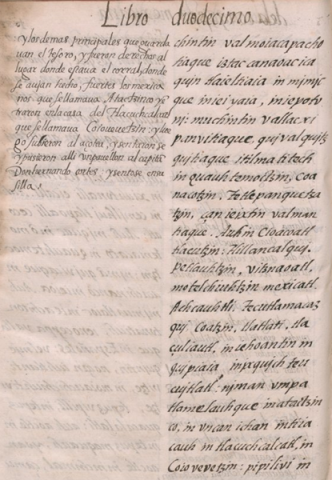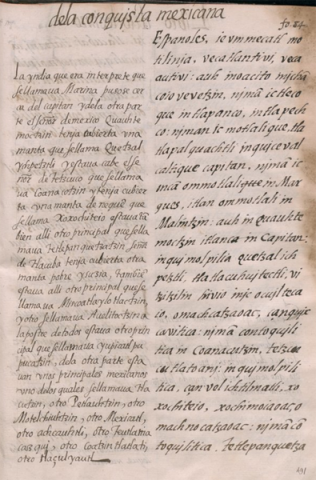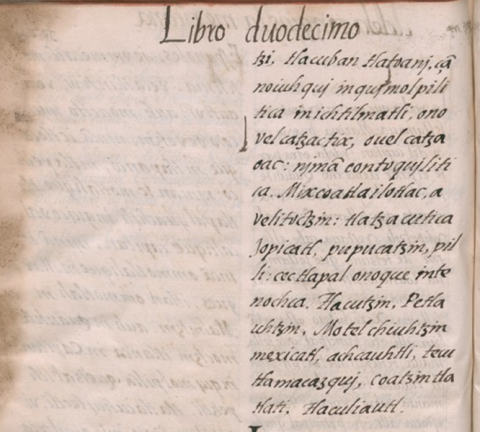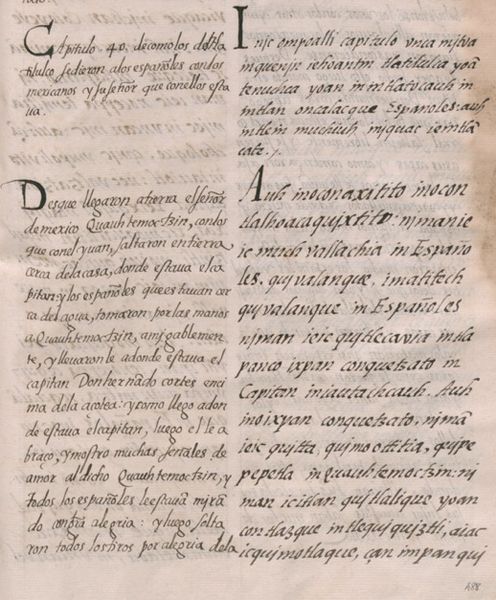 |
[Transcription of the Nahuatl (right-hand column) by James Lockhart:]
[f. 81r., cont.] Inic ompoalli capitulo vnca mitoa in quenin iehoantin tlatilulca yoā tenuchca yoan in intlatocauh in intlan oncalacque Espanoles: auh in tlein muchiuh in iquac ie intlā cate./.
Auh in oconaxitito in ocontlalhoacaquixtito: niman ie ic much vallachia in Españoles, quivalanque, imatitech quivalanque in Españoles niman ie ic quitlecavia in tlapanco ixpan conquetzato in Capitan in iautachcauh. Auh in o ixpan conquetzato, nimā ie ic quitta, quimoottitia, quipepepetla in Quauhtemoctzin: niman ic itlan quitlalique yoan contlazque in tlequiquiztli, aiac ic quimotlaque, çan impan qui
|
[Translation of the Nahuatl (right-hand column) by James Lockhart:]
Forthieth chapter, where it is said how the Tlatelolca and Tenochca and their ruler submitted to the Spaniards, and what happened when they were among them.
And when they had gotten him there and put him on land, all the Spaniards were waiting. They came to take him; the Spaniards grasped him by the hand, took him up to the roof, and stood him before the Captain, the war leader. When they stood him before him, he looked at Quauhtemoctzin, took a good look at him, stroked his hair; then they seated him next to him. And they fired off the guns; they hit no one, but they aimed over
[Translation of the Spanish (left-hand column) by James Lockhart:]
Chapter Forty, of how the Tlatelolca surrendered to the Spaniards along with the Mexica and their lord who was with them.
When the lord of Mexico, Quauhtemoctzin, and those who accompanied him touched land, they disembarked close to the house where the Captain was. The Spaniards who were close to the water took Quauhtemoctzin by the hand in a friendly fashion and conducted him to where Captain don Hernando Cortés was, on the roof terrace. When he got to where the Captain was, he embraced the said Quauhtemoctzin and showed many signs of affection, and all of the Spaniards were gazing at him with great joy. Then they discharged all the cannon for joy over the
|
[Translation of the Nahuatl into Spanish by Fr. Bernardino de Sahagún; transcription of the Spanish (left-hand column) by James Lockhart:]
[f. 81r., cont.] Capitulo .40. de como los del Tlatilulco se dieron a los españoles con los mexicanos y su señor que con ellos estaua.
Desque llegaron a tierra el señor de mexico Quauhtemoctzin, con los que con el yuan, saltaron en tierra cerca de la casa, donde estaua el capitan: y los españoles que estauan cerca del agua, tomaron por las manos a Quauhtemoctzin, amigablemente, y lleuaronle adonde estaua el Capitan Don hernādo cortes encima de la açotea: y como llego adonde estaua el capitan, luego el le abraço, y mostro muchas señales, de amor al dicho Quauhtemoctzin, y todos los españoles le estauā mirādo con grā alegria: y luego soltaron todos los tiros por alegria de la
|
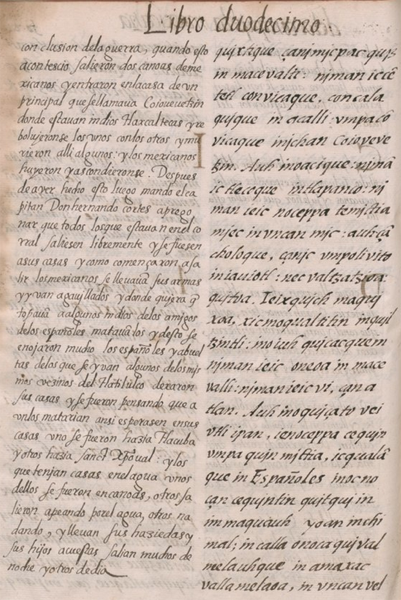 |
[Transcription of the Nahuatl (right-hand column) by James Lockhart:]
[f. 81v.] quixtique çan imicpac quiz in macevalti: niman ic cētetl convicaque, concalaquique in acalli: vmpa cōvicaque in ichan Coiovevetzin. Auh in oacique: nimā ic tlecoque in tlapanco: niman ie ic no ceppa temictia miec in vncan mic: auh çā choloque, çan ic vmpolivito in iauiotl:
nec valtzatzioa: quitoa. Ie ixquich ma quixoa, xicmoqualtitin in quiltzintli: in o iuh quicacque in niman ie ic oneoa in macevalli: niman ie ic vi, çan atlan. Auh in oquiçato vei vtli ipan, ie no ceppa cequin vmpa quinmictia, ic qualāque in Españoles in oc no çan cequintin quitqui in immaquauh yoan inchimal; in calla onoca quivalmelauhque in amaxac vallamelaoa, in vncan vel
|
[Translation of the Nahuatl (right-hand column) by James Lockhart:]
the people, the [shots] just went over their heads. Then they took a [cannon], put it in a boat, and took it to the home of Coyohuehuetzin. When they got there, they took it up on the roof. Then again they killed people; many died there. But [the Mexica] just fled, and the war came to an end.
Then everyone shouted, saying, “Enough! Let everyone leave! Go eat greens!” When they heard this, the people departed; they just went into the water. But when they went out on the highway, again they killed some people, which angered the Spaniards; a few of them were carrying their shields and war clubs. Those who lived in houses went straight to Amaxac, where
[Translation of the Spanish (left-hand column) by James Lockhart:]
conclusion of the war. When this happened, two canoes full of Mexica appeared and entered the house of a leader called Coyohuehuetzin, where the Tlaxcalan Indians were. They got into an altercation and some people were killed there, and the Mexica ran away and hid.
After this was done, Captain don Hernando Cortés ordered it proclaimed that all who were in the enclosure should come out freely and go to their homes. When the Mexica began to come out, they were carrying their weapons and went in gangs. Wherever they encountered any Indians who were friends of the Spaniards, they would kill them. At this the Spaniards became very angry. Following those who were leaving, some of the very citizens of Tlatelolco abandoned their houses and went away, thinking that they would kill them if they stayed in their houses. Some went toward Tacuba, others toward San Cristóbal.
Some of those who had their houses in the water left in canoes, others wading through the water, others swimming. They carried their belongings and their children on their backs. Many left by night, others by day.
|
[Translation of the Nahuatl into Spanish by Fr. Bernardino de Sahagún; transcription of the Spanish (left-hand column) by James Lockhart:]
[f. 81v.] conclusion de la guerra, quando esto acontescio salieron dos canoas de mexicanos y entraron en la casa de vn principal que se llamaua Coioueuetzin donde estauan indios Tlaxcaltecas y reboluieronse los vnos con los otros y murieron alli algunos: y los mexicanos huyeron y ascondieronse.
Despues de aver hecho esto luego mando el capitan Don hernando cortes apregonar que todos los que estauan en el corral saliesen libremente y se fuesen a sus casas y como començaron a salir los mexicanos se llauauā sus armas y yvan agauillados y dondequiera q̄ topauā a algunos indios de los amigos de los españoles matauālos y desto se enojaron mucho los españoles y a bueltas de los que se yvan algunos de los mismos vezinos del Tlatilulco dexaron sus casas y se fueron pensando que avn los matarian ansi* esperasen en sus casas vno se fueron hazia Tlacuba y otros hazia Sanct Xpoual:
y los que tenian casas en el agua vnos dellos se fueron en canoas, otros salieron apeando por el agua, otros nadando, y lleuan sus haziedas y sus hijos a cuestas salian muchos de noche y otros de dia
----------
*ANSI. For "si"; confusion seems to have arisen from inadvertent repetition of "-an" from the preceding word.
|
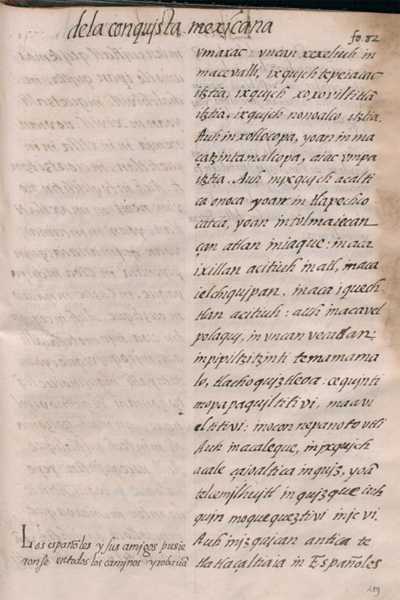 |
[Transcription of the Nahuatl (right-hand column) by James Lockhart:]
[f. 82r.] vmaxac: vncan xexeliuh in macevalli, ixquich tepeiacac itztia, ixquich xoxoviltitlā itztia, ixquich nonoalco itztia. Auh in xollocopa, yoan in maçatzintamalcopa, aiac vmpa itztia.
Auh in ixquich acaltica onoca yoan in tlapechco catca, yoan in tolmaiecan çan atlan in iaque: in aca ixillan acitiuh in atl, in aca ielchiquipan, in aca iquechtlan acitiuh: auh in aca vel polaqui, in vncan vecatlan: in pipiltzitzinti temamamalo, tlachoquiztleoa: cequinti mopapaquiltitivi, maavieltitivi: in oconnepanoto vtli Auh in acaleque, in ixquich acale ça ioaltica in quiz, yoā tel cemilhuitl in quizque iuhquin moquequeztivi inic vi.
Auh in izquican antica tetlatlaçaltiaia in Españoles
|
[Translation of the Nahuatl (right-hand column) by James Lockhart:]
the road forks. There the people divided, some going toward Tepeyacac, some toward Xoxohuiltitlan, some toward Nonoalco. But no one went toward Xoloco and Maçatzintamalco.
And all those who lived in boats and on platforms [in the water] and those at Tolmayeccan just went into the water. The water came to the stomachs of some, to the chests of others, to the necks of others, and some sank entirely into the deep water. The little children were carried on people’s backs. There was a general wail; but some went rejoicing and amusing themselves as they went along the road. Most of the owners of boats left at night, though some left by day. They seemed to knock against each other as they went.
And every stretch [of road] the Spaniards took things from people by force.
[Translation of the Spanish (left-hand column) by James Lockhart:]
The Spaniards and their friends stationed themselves on all the roads and robbed
|
[Translation of the Nahuatl into Spanish by Fr. Bernardino de Sahagún; transcription of the Spanish (left-hand column) by James Lockhart:]
[f. 82r.] Los españoles y sus amigos pusieronse en todos los caminos y robauā
|
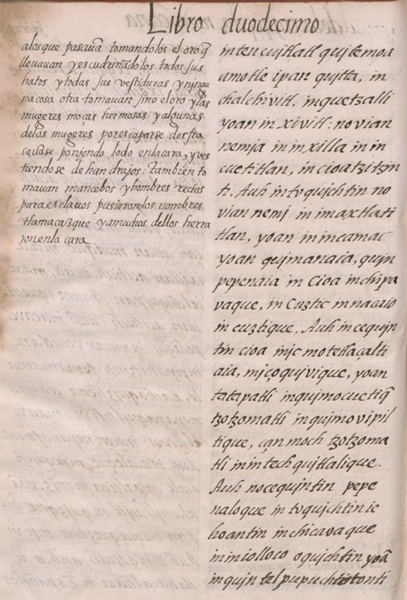 |
[Transcription of the Nahuatl (right-hand column) by James Lockhart:]
[f. 82v.] in teucuitlatl quitemoa amo tle ipan quitta, in chalchivitl, in quetzalli yoan in xivitl: novian nemia in inxilla* in incuetitlan, in cioatzitzinti. Auh in toquichtin novian nemi in imaxtlatitlan, yoan in incamac. yoan quimanaia, quinpepenaia in Cioa in chipavaque, in Cuztic innacaio in cuztique. Auh in cequintin cioa inic motetlaçaltiaia, miçoquivique, yoan tatapatli in quimo cuetiq̄ tzotzomatli in quimovipiltique, çan moch tzotzomatli in intech quitlalique. Auh no cequintin pepenaloque in toquichtin iehoantin in chicaoaque in iniolloco oquichtin yoā in quin telpupuchtotonti
----------
*INXILLA. A word of broad application, xillan encompassed (in addition to metaphorical meanings) abdomen, belly, and womb, and the reference here might be to inspection of the vagina.
|
[Translation of the Nahuatl (right-hand column) by James Lockhart:]
They were looking for gold; they cared nothing for greenstone, precious feathers, or turquoise. They looked everywhere with the women, on their abdomens, under their skirts. And they looked everywhere with the men, under their loincloths and in their mouths. And [the Spaniards] took, picked out the beautiful women, with yellow bodies. And how some women got loose was that they covered their faces with mud and put on ragged blouses and skirts, clothing themselves all in rags. And some men were picked out, those who were strong and in the prime of life, and those who were barely youths,
[Translation of the Spanish (left-hand column) by James Lockhart:]
those who went by, taking the gold they carried and scrutinizing all their gear and clothing; they took nothing but the gold and women who were young and beautiful. In order to escape, some of the women disguised themselves, putting mud on their faces and dressing in rags. They also took youths and strong men for slaves, calling them tlamacazque; they branded the faces of many of them.
|
[Translation of the Nahuatl into Spanish by Fr. Bernardino de Sahagún; transcription of the Spanish (left-hand column) by James Lockhart:]
[f. 82v.] a los que pasauā tomandolos el oro q̄ lleuauan y escudrinādolos todos sus hatos y todas sus vestiduras y ninguna cosa otra tomauan sino el oro y las mugeres moças hermosas y algunas de las mugeres por escaparse desfracauāse* poniendo lodo en la cara, y vestiendose de handrajos: Tambien tomauan mancebos y hombres recios para esclauos pusieronlos nombres tlamacazque y a muchos dellos herraron en la cara.
----------
*DESFRACAUĀSE. For disfraçauāse."
|
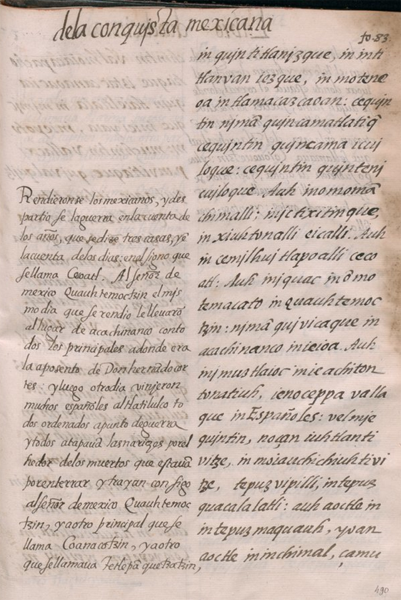 |
[Transcription of the Nahuatl (right-hand column) by James Lockhart:]
[f. 83r.] in quintitlanizque, in intitlanvan iezque, in moteneoa intlamacazcaoan: cequintin nimā quincamatlatiq̄ cequintin quincamaicuiloque: cequintin quintenicuiloque.
Auh in omomā chimalli; inic tixitinque, in xiuhtonalli ei calli. Auh in cemilhuitlapoalli ce coatl:*
Auh in iquac in ōmotemacato in Quauhtemoctzin: nimā quivicaque in acachinanco in ie ioa. Auh in imuztlaioc in ie achiton tonatiuh, ie no ceppa vallaque in Españoles: vel miequintin, no çaniuh tlantivitze,** in moiauchichiuhtivitze, tepuzvipilli, in tepuzquacalalatli: auh aoctle in intepuzmaquauh, yoan aoctle in inchimal, ça mu
----------
*CE COATL. The month is not given, but this date is not compatible with the elaborate calendrical account given in chaps. 27 and 28. Here the war ends in Three House (coinciding with 1521); there it was already well into Four Rabbit (1522) when the Spaniards returned from Tlaxcala to begin the siege. Factual accuracy is not the main point of interest here, but chaps. 27 and 28 extend the Spaniards' absence far too long.
**NO ÇANIUH TLANTIVITZE. The meaning of this phrase is especially obscure.
|
[Translation of the Nahuatl (right-hand column) by James Lockhart:]
to run errands for them and be their errand boys, called their tlamacazque [priests, acolytes]. Then they burned some of them on the mouth [branded them]; some they branded on the cheeks, some on the mouth.
And when the weapons were laid down and we collapsed, the year count was Three House, and the day count was One Serpent.
And when Quauhtemoctzin went to give himself up, they took him to Acachinanco; it was already dark. And the next day, when there was a little sun, the Spaniards came again, a great many of them; they too had reached the end. They came equipped for battle, with iron cuirasses and iron helmets, but not with their iron swords and their shields.
[Translation of the Spanish (left-hand column) by James Lockhart:]
The Mexica surrendered and the war ended in the year count [during the year] called Three Houses, and in the day count on the sign called Ce Coatl.
The same day that the lord of Mexico, Quauhtemoctzin, surrendered, they took him with all the leaders to the place Acachinanco, where the lodging of don Hernando Cortés was. Then the next day many Spaniards came to Tlatelolco, all in order and ready for battle. They all covered their noses because of the stench of the dead who were unburied. They brought with them the lord of Mexico, Quauhtemoctzin, and another leader called Coanacochtzin, and another called Tedepanquetzatzin,
|
[Translation of the Nahuatl into Spanish by Fr. Bernardino de Sahagún; transcription of the Spanish (left-hand column) by James Lockhart:]
[f. 83r.] Rendieronse los mexicanos, y despartiose la guerra en la cuenta de los años, que se dize tres casas, y ē la cuenta de los dias: en el signo que se llama Ce coatl.
Al señor de mexico Quauhtemoctzin el mismo dia que se rendio le lleuarō al lugar de acachinanco con todos los principales adonde era la* apostento de Don hernādo cortes: y luego otro dia vinieron muchos españoles al tlatilulco todos ordenados a punto de guerra y todos atapauā los narizes por el hedor de los muertos que estauā por enterrar y trayan consigo al señor de mexico Quauhtemoctzin, y a otro principal que se llama Coanacotzin, y a otro que se llamaua Tetlepāquetzatzin,
----------
*LA. For "el."
|
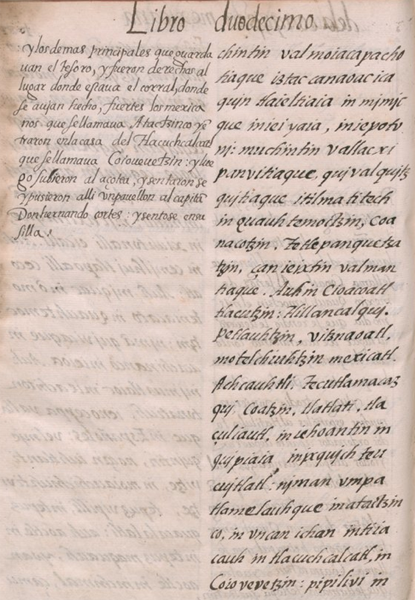 |
[Transcription of the Nahuatl (right-hand column) by James Lockhart:]
[f. 83v.] chintin valmoiacapachotiaque iztac canaoac ica quintlaieltiaia in mimicque in ie iyaia, in ie potoni: muchintin vallacxipanvitiaque, quivalquitzquitiaque itilmatitech in Quauhtemoctzin, Coanacotzin, Tetlepanquetzatzin, çan ieixtin valmantiaque. Auh in Cioacoatl tlacutzin: Tlillancalqui. Petlauhtzin, vitznaoatl, motelchiuhtzin mexicatl. Achcauhtli, Tecutlamacazqui, Coatzin, tlatlati, tlaçuliautl,* in iehoantin in quipiaia in ixquich teucuitlatl:
niman vmpa tlamelauhque in atactzinco, in vncan ichan in tiiacauh in tlacuchcalcatl, in Coiovevetzin: pipilivi in
----------
*CIOACOATL . . . TLAÇULIAUTL. Which titles go with which names remains somewhat speculative, but I believe the correspondence in the translation of the Nahuatl is better than in the Spanish version.
|
[Translation of the Nahuatl (right-hand column) by James Lockhart:]
They all came pressing narrow white cloths to their noses because the dead made them sick, for they were smelling bad and stinking. They all came on foot, holding Quauhtemoctzin, Coanacochtzin, and Tetlepanquetzatzin by their capes; only the three of them came <in line>. And the Cihuacoatl Tlacotzin, the Tlillancalqui Petlauhtzin, the Huitznahuatl Motelchiuhtzin mexicatl, the Achcauhtli Teuctlamacazqui [senior lordly priest] Coatzin, and the treasurer Tlaçolyaotl guarded all the gold.
Then they went straight to Atactzinco, where the home of the warrior the Tlacochcalcatl Coyohuehuetzin was. The Spaniards were in a line
[Translation of the Spanish (left-hand column) by James Lockhart:]
and the other leaders who guarded the treasure.
They went straight to where the enclosure was in which the Mexica had fortified themselves, called Atactzinco, and went into the house of the Tlacochcalcatl, who was called Coyohuehuetzin. Then they went up on the roof terrace and sat down; they put up a canopy there for Captain don Hernando Cortés, and he sat down in his chair.
|
[Translation of the Nahuatl into Spanish by Fr. Bernardino de Sahagún; transcription of the Spanish (left-hand column) by James Lockhart:]
[f. 83v.] y los demas principales que guardauan el tesoro,
y fueron derechos al lugar donde estaua el corral, donde se auian hecho, fuertes los mexicanos que se llamaua Atactzinco y ētraron en la casa del Tlacuchcalcatl que se llamaua Coioueuetzin: y luego subieron al açotea, y sentaronse y pusieron alli vn pauellon al capitā Don hernando cortes: y sentose en su silla.
|
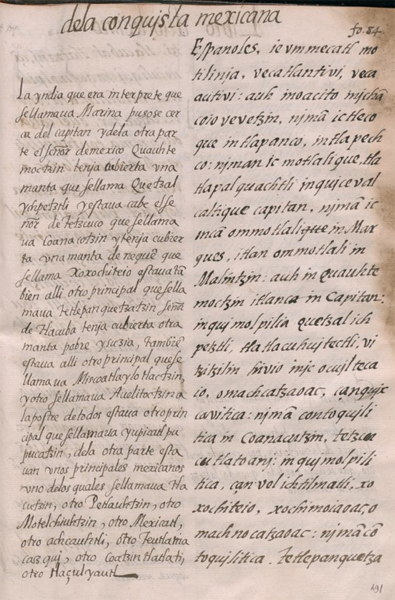 |
[Transcription of the Nahuatl (right-hand column) by James Lockhart:]
[f. 84r.] Espanoles, ie vmmecatl* motilinia, veca tlantivi, veca acitivi: auh in oacito in ichā coiovevetzin, nimā ic tlecoque in tlapanco, in tlapechco: niman ic motlalique, tlatlapalquachtli in quicevalcaltique capitan, nimā ic oncā ommotlali in Marques, itlan ommotlali in Malintzin:
auh in Quauhtemoctzin itlan ca in Capitan: in quimolpilia Quetzalichpetztli, tlatlacuhuitectli, vitzitzilin hivio inic ocuiltecaio, omach catzaoac, çan quixcavitica: nimā contoquilitica in Coanacutzin, tetzcucu tlatoani: in quimolpilitica, çan vel ichtilmatli, xoxochiteio, xochimoiaoac, omach no catzaoac: nimā cōtoquilitica. Tetlepanquetz
----------
*VMMECATL. The mecatl (literally, “rope”) was a varying and in any case little understood measure used primarily in laying out fields.
|
[Translation of the Nahuatl (right-hand column) by James Lockhart:]
stretching for two mecatl, reaching far off to its end. And when they reached the home of Coyohuehuetzin, they went up on the roof to a platform. Then they sat down. They placed a canopy of varicolored cloth over the Marqués; then he sat down, and Marina sat beside him.
And Quauhtemoctzin was next to the Captain. He had tied on a shining maguey fiber cloak, each half different, covered with hummingbird feathers, Ocuillan style. It was very dirty; it was all he had. Then Coanacochtzin, the ruler of Tetzcoco, was next. He had tied on only a plain maguey fiber cloak with a flowered border, with a spreading design of flowers; it too was very dirty. Next was Tetlepanquetzatzin,
[Translation of the Spanish (left-hand column) by James Lockhart:]
The Indian woman who was interpreter, called Marina, placed herself close to the Captain, and on the other side was the lord of Mexico, Quauhtemoctzin; he was covered with a cloak called quetzalichpetztli. Next to him was the lord of Tetzcoco, called Coanacochtzin; he was covered with a cloak of maguey called xoxochitenyo. Another leader was also there, named Tetlepanquetzatzin, lord of Tacuba; he was covered with another poor and dirty cloak. Another leader was also there, called Mixcoatlailotlactzin, and another called Ahuelitoctzin. Last of all was another leader named Yopicatl Popocatzin. On the other side were some Mexica leaders, one of whom was called Tlacotzin, another Petlauhtzin, another Motelchiuhtzin, another Mexicatl, another Achcauhtli, another Teutlamacazqui, another Coatzintlatlati, and another Tlaçolyaotl.
|
[Translation of the Nahuatl into Spanish by Fr. Bernardino de Sahagún; transcription of the Spanish (left-hand column) by James Lockhart:]
[f. 84r.] La yndia que era interprete que se llamaua Marina pusose cerca del capitan y de la otra parte el señor de mexico Quauhtemoctzin tenia cubierta vna manta que se llama Quetzalychpetztli y estaua cabe el señor de Tetzcuco que se llamaua Coanacotzin y tenia cubierta vna manta de nequē que se llama Xoxochiteio estaua tābien alli otro principal que se llamaua Tetlepanquetzatzin señor de Tlacuba tenia cubierta otra manta pobre y suzia, tambiē estaua alli otro principal que se llamaua Miscoatlaylotlactzin, y otro se llamaua Auelitoctzin a la postre de todos estaua otro principal que se llamaua yupicatl pupucatzin, de la otra parte estauan vnos principales mexicanos vno de los quales se llamaua Tlacutzin, otro Petlauhtzin, otro Motelchiuhtzin, otro Mexicatl, otro achcauhtli, otro Teutlamacazqui, otro Coatzintlatlati, otro tlaçulyautl
|
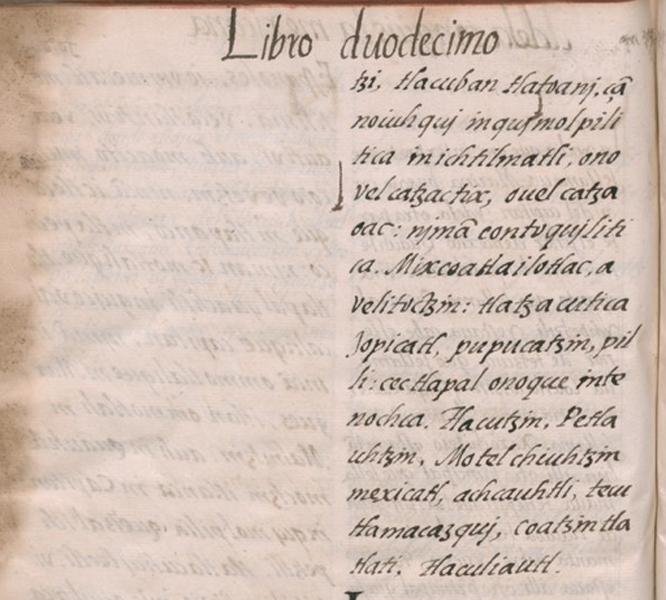 |
[Transcription of the Nahuatl (right-hand column) by James Lockhart:]
[f. 84v.] tzi, tlacuban tlatoani, çāno iuhqui in quimolpilitica in ichtilmatli, o no vel catzactix, o uel catzaoac: nimā contoquilitica. Mixcoatlailotlac, avelitoctzin: tlatzacutica Iopicatl, pupucatzin, pilli: cectlapal onoque in tenochca. Tlacutzin. Petlauhtzin. Motelchiuhtzin mexicatl, achcauhtli, tecutlamacazqui, coatzin tlatlati, Tlaculiautl.*
----------
*TLACULIAUTL. Read “tlaçuliautl.”
|
[Translation of the Nahuatl (right-hand column) by James Lockhart:]
the ruler of Tlacopan, who likewise had tied on a maguey cloak; it too was dirtied, very dirty. Next was the Mixcoatlailotlac Ahuelitoctzin. Last was Yopicatl Popocatzin, a nobleman. To the side were the Tenochca Tlacotzin, Petlauhtzin, Motelchiuhtzin mexicatl, the Achcauhtli Teuctlamacazqui Coatzin, and the treasurer Tlaçolyaotl.
[Translation of the Spanish (left-hand column) by James Lockhart:]
(intentionally blank)
|
[Translation of the Nahuatl into Spanish by Fr. Bernardino de Sahagún; transcription of the Spanish (left-hand column) by James Lockhart:]
[f. 84v., la parte de arriba; sin dibujos y sin texto en español]
|
